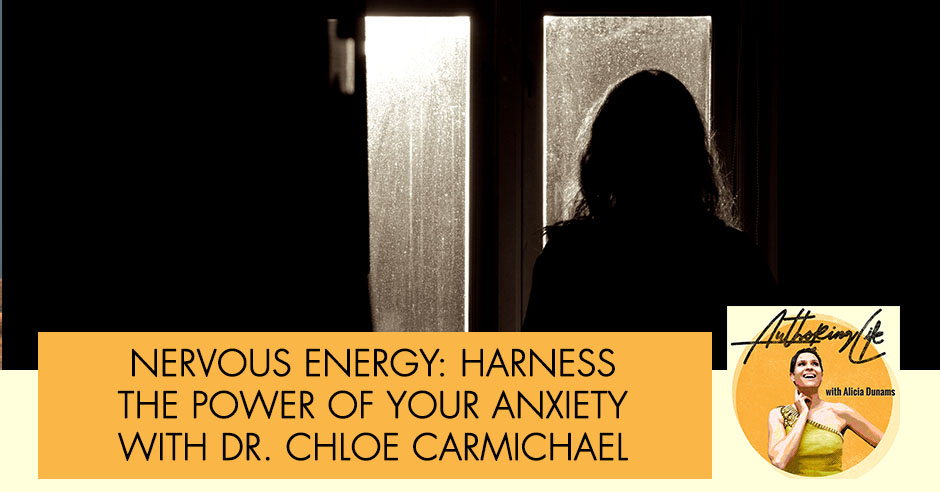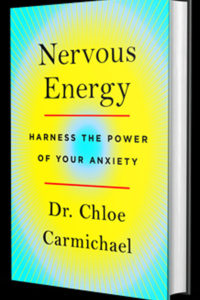
How can you use your anxiety to get things done? Alicia Dunams sits with a longtime friend, Dr. Chloe Carmichael, the author of Nervous Energy: Harness the Power of Your Anxiety. Self-criticism or analysis paralysis often gets in the way of feeling efficient. To work around this, Dr. Chloe came up with the “To-Do List with Emotions” technique. When you look at your tasks and think of the emotion that accompanies each of them. Do you sense a problematic feeling, such as overwhelm, associated with a task? If so, layer in a self-care plan around that to make you feel excited or grateful. If you want more tips on how to harness the power of your anxiety, listen to this episode.
—
Listen to the podcast here
Nervous Energy: Harness The Power Of Your Anxiety With Dr. Chloe Carmichael
Welcome to another episode. I’m very excited to introduce Dr. Chloe Carmichael, Clinical Psychologist and Author of the book Nervous Energy: Harness the Power of Your Anxiety. Let me tell you a little bit about Dr. Chloe. She holds a Doctorate in Clinical Psychology. Her private practice focuses on stress management, relationship issues, self-esteem and coaching. She is a former adjunct college professor, yoga instructor, which is important in calming those nerves, and Psychologist for the New York College of Podiatric Medicine. Dr. Chloe, it’s so great to have you here. What I’m excited about is your second book.
That’s my third. I wrote one when I was eight years old, but it was never published. This will be number two that has been published. One is self-published and one is with a big publisher.
We’re going to talk about the one with the big publisher because you and I worked on your self-published one. I want to jump into Nervous Energy: Harness the Power of Your Anxiety. I have a question for you I would like to get started with. Why did you write this book in particular?
It’s because I knew that it was time to write a book. It was an interesting process of how that was explained to me. When it was decided that I needed to write a book and I started thinking about what would be the best topic, I was asked, “What are the things that you’re always telling clients over and over again?” I was also given feedback that part of what was interesting about my story is that I have this practice on Park Avenue in Manhattan with all these super high-performing people.
This might sound weird, but it hadn’t stood out to me before that it was an important part of the story. It was framed to me to think about a story that people would be interested in, like how a Park Avenue psychologist opens up and shares some stories but also what are the things that I share and I’m telling people over and over again. It was these nine techniques that were featured in the book. That’s how it came to be, to answer the question of how and why this particular book came about.
When we worked on your first book, which was self-published, it was about relationships. You have a lot of experience, not only with yourself but also with your clients of being single in New York City. That supported you in writing your first book. This book is about being a clinical psychologist and sharing what you share with others. That’s what I always tell people. Write a book because whatever you’re repeating over and over again, you might as well put it in a book. That way, they can purchase the book.
Say it while it’s fresh. As you pointed out, the first book that we did together or the self-published book is Dr. Chloe’s 10 Commandments of Dating. At that time, I was doing a lot of work helping people with their dating goals. I’ve thought in some ways even about pulling that book off the market, rewriting it, resharing it and blending in the nervous energy techniques because I was using the same techniques. The first book, Dr. Chloe’s 10 Commandments of Dating, says, “Here’s what you should do to stay grounded and effortful in a goal-oriented dating situation.”
With the nervous energy techniques, I may blend those in to say, “Here’s how you do it and use some of those techniques to reach those goals.” Another reason why I’m glad I wrote that book way back when a few years ago is because it is nice to be able to get those things down on paper and the accompanying video when they feel fresh in your mind so that you don’t have to keep repeating them to people. Getting those things out there freed me to grow and move on in other ways. It’s nice that they’re always captured there any time that we want to go back to them.
That book and this book is getting you a lot of PR, publicity and media, which is a reason for people to write books. That’s how I encourage people to write books. Let’s specifically talk about Nervous Energy. I want you to share some of the life tools that you have in your book to help people harness their nervous energy.
Before I do that, though, I do want to focus on what you said. You knew that the books were helping me to get media attention, which is true. It’s great. For people interested in getting or launching a book, building a pattern of media notice and interaction that isn’t always related to your book helped me. Big publishers were, for example, looking at the fact of my media attention as part of their process of offering me that book deal.
You wrote a self-published book, Dr. Chloe’s 10 Commandments of Dating. What year did that come out?
Writing books can be therapeutic because it helps you get your thoughts down on paper.
It was 2016.
You were getting a lot of PR around dating and doing a lot of Valentine’s.
It’s not just dating. The impetus for Dr. Chloe’s 10 Commandments of Dating did come through a TV appearance that I was doing for Fox 5 in New York with Ernie Anastos. He has been nominated or won 23 times for Emmy Awards. He had me on to talk about New York’s dating season. To be prepared for that segment, I listed my top ten tips even though I knew I would never have time to share them all in the air because TV is such a hurricane whirlwind. I had them prepared. Ernie is such a warm and encouraging person. He said, “Chloe, you should pop those into a book. You need to.”
For that book, I did a video first where I, on camera, spoke about each one of those top ten tips. I had somebody transcribe my video because it was easier for me to talk. It’s a very simple and straightforward book. I simply edited that Word document. For people who are interested in getting media attention in the first place, I’m happy to share about that too. You’re right to notice that there’s a big interaction or at least for me, between what I’m writing about, what I’m talking about in the media and what people are interested in. It’s like a conversation, for sure.
You gave people a great tip. One of the methodologies in Bestseller in a Weekend, my program, is to record, transcribe and turn it into a book. It’s one of the quickest ways to create book content. That’s how you created the first book. We went on and self-published that. Since we’re talking about this, I want to hear from you because I get this from clients all the time. They’re like, “If I self-publish my first book, will I get a traditional publishing deal?” They’re very frightened to self-publish. I want to hear from you how that transition was to self-publish. You were getting your media, known in New York in terms of your clinical psychology work and getting a publishing deal with a traditional publisher. How did that transition go? Is it okay to self-publish your first book?
In my book, it certainly is okay. That’s what I did. I don’t know why people would be afraid of it. They’re putting out their best material and then think that they can’t.
They don’t sell enough books. That’s the biggest thing because traditional publishers often look at what were the sales of your previous book, for example.
I don’t think that my 10 Commandments of Dating books sales were particularly strong and was a factor. My guess is it could certainly work to your benefit. If you had amazing sales, then the publishers would say, “This is what she can do on her own. Look at what we could do for her.” In my case, I didn’t have any wildfire sales on that first book. It was great practice for me. It helped me to encapsulate my thoughts. It also was a good work product for publishers to look at.
When the idea of me writing a book and all they had seen with my proposal came about to them, they could say, “She did write this other book. Let’s take a look.” It showed them something of a work sample of mine. I don’t think that they cared too much about the honestly very small sales because I had not personally done much to bring that book out to the world. I don’t have a worldwide publishing platform. I just published it. I did it with you together in our course, which was awesome.
I pushed out certainly to my network and grew my network a bit with it. There were a lot of positives around it but did it turn me into a volume sales author? No, but that’s okay for me. My next book, Nervous Energy: Harness the Power of Your Anxiety, has been because it was put out by a bigger publisher translated, for example, into Russian, Turkish and Mandarin.
It was published originally in hardcover. We have, which is a good thing, decided to publish it in paperback, which will happen in March of 2022. Also, getting my endorsement by Deepak Chopra for Nervous Energy was a big excitement. I’m thinking of even blending them. To answer anybody’s question about if self-publishing first hurts you or to be afraid of slow numbers from that original effort, from my perspective, it was not a problem.

It’s a good book and topic. You’re being able to be endorsed by Deepak Chopra and build your energy, audience from your initial book and all the publicity that came from that.
Honestly, it’s the practice. It was almost like a dress rehearsal for a much bigger debut of Nervous Energy because, in that situation, you had the publishers, publicists and all these other things behind it. What I did with my self-published book was much smaller, but it was a big learning experience. The book still sells. My sales are not incredibly strong on it, but it is nice to see that it sells. Also, for me, as a psychologist, everyone’s perspective and reason for publishing are different.
In my case, it’s handy to have that when somebody comes to me saying, “I need to know about relationships and all this stuff.” They want to go deep into it, yet they or I don’t have the time to work together. One-to-one is not going to be practical. I can at least say to them, “There is that book that I wrote.” I also made it in an audiobook. It’s there and it’s available. I find it’s a nice resource to give people who want to know some slice of your expertise.
Writing a book is the first productization of what’s up here or your expertise. For any thought leader, business leader or service provider, if you are tapped out in terms of the one-to-one or you’re repeating the same thing over and over again, take that content and turn it into a book. It’s available to the masses.
It’s fun for social media too. For example, for Valentine’s Day 2022, we reaired a free livestream from 2021’s Valentine’s, where I went through Dr. Chloe’s 10 Commandments of Dating. It’s a free Livestream on Valentine’s Day. We can repurpose little snippets of that Livestream in social media for years to come. I do think it’s a nice almost resource library for yourself to build as well.
We should add that you used your 10 Commandments to get married. Was that part of it?
The book was about my experience advising people in the New York City dating market, known as one of the toughest dating markets. That was a part of the perspective of Nervous Energy too. It’s looking at this lens of the ultra-gritty type-A people. For me, writing books has been therapeutic and getting into a subject. That was helpful for me to get my thoughts down on paper.
You heard it from Dr. Chloe. Write a book. You know who to contact if you need to write a book. I’m here to support you.
In that department, one of the things as a clinical psychologist is I always work with people about goals, learn to delegate and work with a big publisher. I don’t have to worry about any of that stuff on how to “publish” a book. It’s the same thing in working with you. I wrote the book. That’s what I did. My assistant, you and your assistant executed something very nice, which was helpful. For anyone who is thinking about writing a book but feels daunted by the admin side, it’s best to get that off your plate if you can.
Thank you for that. Let’s jump into Nervous Energy, your second book endorsed by Deepak Chopra as we share. Congratulations on that. Share some life lessons or actual tools that the audience can use at home that they can learn from your book. You can purchase the book on Amazon.com and your local bookstore. What are some lessons you want to share?
One of the techniques in the book is called the To-Do List with Emotions. In the book, I share how I used this technique to write my dissertation. This could be handy for people in some senses, maybe who are working with book writing to-dos. It works with any type of to-do. As we all know, you can make a list of your to-dos. I have found that, whether it be myself or people I’m working with, 1 of 2 things can happen, which is that either we are knocking out our to-dos very well or we feel like a hamster on a wheel. We’re not feeling connected to the tasks.
We sometimes miss out on the chance to drink up positive emotions if we’re so focused on getting things done.
We start to feel almost like a productivity machine or sometimes we hit a wall. There are certain things on the list that are not getting done. It spirals into all kinds of nonsense within ourselves of criticism, perfectionism or analysis paralysis about those things. With To-Do List with Emotions, we look at our to-do list and then think about the emotion that accompanies each item on the to-do list. For problematic emotions, suppose that I needed to write a book proposal, my emotion for that was overwhelmed. You can layer in a self-care plan around that.
One of the examples I shared in my book for writing my dissertation was that even though I was living off of student loans, living in a single-room housing in Manhattan and had nothing but student loan debt, I would take myself to a fancy restaurant and sit at the restaurant bar with my laptop. I had a rule for myself that I had to be writing the whole time, but I could eat and drink whenever I wanted the whole time. That was my example of how I got some writing done by paying attention to what was on my list, the emotions around it that may have blocked me and then addressing them.
That is important because the to-do list doesn’t get done oftentimes because there are negative emotions wrapped around it. I can see that.
We can sometimes miss out on the chance to drink up the positive emotions if we get so focused on getting things done. For example, you finish that draft, finish some segment of the writing or get to do something positive on your to-do list, like suppose that you get a call from a writing agent and it’s on your to-do list that you have to complete their profile. It’s to be able to ask yourself, “What is the emotion that comes with that?” It might be wild enthusiasm or gratitude. It’s to even layer in plans and activities around that and say, “I went and sat in the park to soak up this moment.” It can go both ways and in good directions too.
What’s another tip that you want to share with our audience at home? They’re going to go and purchase the book on Amazon.com or their local bookstore.
For people that do want some of my tips for free, they can go to NervousEnergyBook.com. That’s where they can even get a video of me going through some of the techniques for free. Your readers know that we authors like to drop those URLs so that people can connect because I do love to connect, whether it be online or social media. I like all the tips, but another one that can be fun is called Worry Time. That one is an old favorite in a lot of Cognitive Behavioral Therapy literature.
What we do in that one is we have worries pop into our minds and they feel almost random like, “What should I do about my life insurance? Maybe I should check something in the version of my manuscript.” We’re simply standing in line at the grocery store when these little thoughts are racing through our minds. What we do with Worry Time is put them into a designated calendar event that we have with ourselves. For some people, let’s say it’s every Thursday at noon.
They can deposit any random thoughts into that calendar event. What that does is it lets your brain move on mentally instead of feeling like you have to keep that problem in your working memory or address it right then and there. It lets you move on, but it also doesn’t let you lose track of it because a lot of times, we’re having valid thoughts. It’s a nice happy medium for people with active minds to keep track of all their thoughts without becoming self-critical.
One of the things I noticed is that sometimes people would be self-critical and say, “Why can’t I be in the moment? Why is my mind always going 100 miles an hour?” I wanted them to know that their mind was coming up with valid thoughts and that I have clients that I wish would think more a little bit about the future and these thoughts. They were giving themselves a false choice by thinking that they had to either put it out of their mind to be in the moment or deal with it right then and there. The Worry Time technique helps them.
Those are two tips out of the nine tools that you give in your book. Those are fantastic. I want to jump into our lightning round. This is where I ask you questions and you share the first thing that comes to your mind. You want to get your water in and roll up your sleeves. What is your legacy?
That would be my son, Billy. He is my living legacy. Being a mom has been one of the biggest gifts of my life.

What is your favorite book?
Of mine, Nervous Energy is my favorite. There’s another book that I like by Roger Ailes called You Are the Message: Getting What You Want by Being Who You Are.
Who is your favorite author?
I’ll go with Dale Carnegie because another oldie but goodie is How to Win Friends and Influence People. It’s hard to choose a favorite. I also like Brian Tracy, who, of all people, has been doing some interesting things on social media.
What are you going to read next? What’s on your bedroom side table?
There’s a book called Waves of Mercy. It’s a historical fiction novel written based in the town where I grew up. I’m excited to read it.
Here’s the final question. I’m curious. What are you writing next?
There’s Nervous Energy: Harness the Power of Your Anxiety. I’ve been talking about different ideas with people, for example, Nervous Energy for Parents or Nervous Energy in Relationships. Also, some people have been interested in the meditative side, like a book around my favorite meditations. I’m also thinking about taking my materials for therapists and their practice building. I already have it in a video course. I’ve thought that it might be another one that would be easy enough to also create into a book.
You are prolific and filled with content. Continue doing what you are doing.
Thank you, Alicia. You helped me to realize that. One of our conversations from a few years ago stands out to me where we were having a conversation or coaching call about that book. Somehow it came up that we were talking about what’s next or what to do. You said to me, “Chloe, you enjoy making content.” You said it was something that wouldn’t necessarily be true for everybody, which I hadn’t quite realized before. It would almost be like saying, “Chloe, you breathe oxygen.” I realized, “I do.” For some reason, being clear about that helps me to start creating a good team that helps me with social media or other ways of realizing that. Thanks for putting that fine point on it for me.
I see my clients and how impactful they are, especially you, how you impact others that you touch and that you get to continue pouring into people. I always fan the flames of greatness and encourage my clients.
Being clear about what you’re good at helps you create an excellent team to help you with that.
On that note, I warned you that I may have 1 or 2 questions for you. Certainly, I thought your readers might even enjoy the chance too to read some of your perspectives on these things. On the subject of someone you mentioned like me who has first done a self-published book and then a published book, I was thinking about pulling the first self-published book off the market, Dr. Chloe’s 10 Commandments of Dating, revamping and reworking it.
The book itself is 50 pages long. It’s almost a booklet. I feel that I have a lot that I could do with it. I could turn it into a 200-page book that had a lot more to say. Do you have any thoughts on the process of how to do that? Do you simply pull it off the market? One of the beauties of self-publishing is that you can do that. I would love any thoughts you have on that.
There are a couple of things or ways we can look at it. The first way would be to pull it off the market and then put a new and improved or expanded edition out. You can do it that way or leave the older one on the market and then do an expanded edition. For people who want the 50-page booklet or the 200-page expanded and improved book, you can leave it out there and self-publish it. Since you have a connection with a literary agent and a publisher, perhaps you take it off the market, do the revised vision and put it out as a traditionally published book again. You can get an advance and have the support of a publishing house behind you to put it out there and revamp it in that way.
Thank you for those thoughts. I hadn’t thought about that. I had thought, “I would have to pull it off,” but I could leave both up or do an expanded and improved. I like those words.
You want different ISBNs. That’s exciting news. More people are hearing you and what you have to contribute in terms of nervous energy, the clinical psychology world, supporting people with stress management and anxiety management. Also, there’s a renewed interest in your tips for finding love. When there’s renewed interest, there’s more content because you have more case studies, more people that you’ve worked with and more people who have used your methodology and it has worked. I would go after that more expanded edition.
Here’s another question. I also have a chapter in a book coming out in March 2022 about leadership. Another thought is Nervous Energy for Leadership. I’m curious if somebody has a few ideas for books and they were trying to think about which ones to pursue. There are a lot of ways to think about that. How do you help people to narrow the fields if their eyes are bigger than their stomachs in terms of book ideas?
I always look at who’s your last three clients. Are your last three clients one-on-one clients or people who hire for speaking?
Speaking has been one of the most awesome things with Nervous Energy. I’ve been doing a lot of corporate speaking about anxiety.
If you find that corporate clients or your last three clients are maybe the best-paying clients, you want to create a book they want to promote. You will get more of those clients. If you’re speaking to corporate, it would be like Nervous Energy for Leaders or the C-Suite, for example. You can do more of those. Always look at who’s paying you the most money if that’s what motivates you. You want to look at what motivates you.
Time with my son motivates me. Money is a way to get that. An important piece of it is compensation.
Are you traveling for these corporate or you’re doing Zooms?

The beauty of it is I am doing all of this virtually. I truly cannot believe the income that I can get speaking virtually. The law firm Baker McKenzie, the third-largest law firm in the world, gave 300 copies of my books out to their employees. I’ve been doing all this speaking from home and I love it. That’s helpful because although it could be an “interesting” project for me to do the expanded edition of the dating book, it could maybe be a wiser move for me to focus perhaps on the Nervous Energy for Leaders and think about those things. Thank you, Alicia.
You want to focus on selling your book Nervous Energy over here in bulk so you can sell your book in bulk and then include your speaking. I think about Brené Brown, who is a speaker. She did not like traveling and didn’t want to be away from her family. You can create your ideal life based on your particular goals. I don’t know how much she makes. I’m not privy to that, but I’m sure she does very well in 30 to 60-minute Zooms to corporate. She doesn’t have to leave home anymore. Write books to create content for that particular audience. You will get more of those legal law firm clients that you’ve had.
That’s what it is. My son is young. I don’t want to be away from home. Thank you.
I’m excited. Let me know if there’s any way I can support you. I’m always available for a coaching call with you any day.
Thank you, Alicia.
With that, I want you to share. What’s one last thing you want to leave our audience at home?
I would let them know that I do love to connect with people. Whatever your favorite social media is, I’m on it. It is @DrChloe. If you go to NervousEnergyBook.com, there will also be links to all of my socials. I would love to hear from people. If you want to share on social media what you’re writing about or what your goals are, I love hearing about it.
Everyone, go to NervousEnergyBook.com to learn more about Dr. Chloe Carmichael and purchase Nervous Energy. Dr. Chloe, thank you so much for being here.
Thanks, Alicia. It’s great to see you.
I so appreciate you. Be well, everyone. Until next time.
Important Links:
- NervousEnergyBook.com
- Dr. Chloe’s 10 Commandments of Dating
- Bestseller in a Weekend
- Amazon.com
- You Are the Message: Getting What You Want by Being Who You Are
- How to Win Friends and Influence People
- Waves of Mercy
- @DrChloe – Instagram
About Chloe Carmichael

